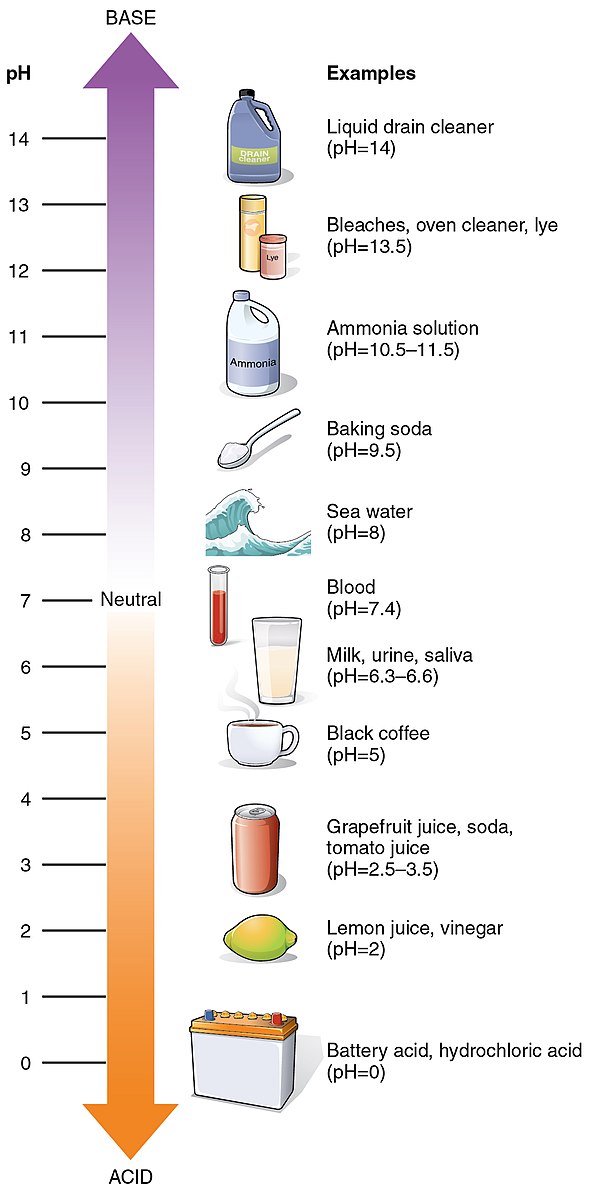The pH value of calcium carbonate in water is slightly above 7, making it basic in character. This is due to the hydrolysis of calcium carbonate in aqueous solution, which results in the release of OH- ions. Understanding the pH of calcium carbonate in water is crucial for maintaining water quality and preventing the formation of contaminants.
Solubility and Hydrolysis of Calcium Carbonate
Calcium carbonate is a common substance found in rocks, shells, and other natural materials. It has a low solubility in water, with a solubility product (Ksp) of 3.3×10 at 25°C. When calcium carbonate dissolves in water, it undergoes a hydrolysis reaction, which results in the release of hydroxide (OH-) ions. This reaction can be represented as follows:
CaCO3 + H2O ⇌ Ca2+ + HCO3- + OH-
The presence of these hydroxide ions in the solution increases the pH, making the water slightly basic, with a pH typically above 7.
pH Range and Precipitation
 Image source: OpenStax College
Image source: OpenStax College
The pH of water containing calcium carbonate can vary depending on the specific conditions. At pH values less than about 6, the water is more acidic, and the dominant species are dissolved carbon dioxide and a small amount of carbonic acid. As the pH increases to between 6.5 and 10, calcium carbonate begins to precipitate out of the solution, forming solid deposits.
The precipitation of calcium carbonate can be represented by the following reaction:
Ca2+ + CO32- ⇌ CaCO3 (s)
This precipitation process is important in the formation of limestone, chalk, and other carbonate-rich rocks, as well as in the development of hard water in many regions.
Contaminants and pH Adjustment
The pH of water containing calcium carbonate can be affected by various contaminants and reactions. For example, the reaction of calcium carbonate with acids can release carbonic acid, which can then decompose into carbon dioxide and water. This can lead to the formation of carbon dioxide upon heating, a process known as calcination.
To maintain the appropriate pH of water containing calcium carbonate, it is important to monitor and adjust the pH as needed. This can be done by adding chemicals to the water, such as acids or bases, to adjust the pH to the desired level. Alternatively, water treatment systems can be used to maintain the pH at a specific range.
Home Remedies for pH Adjustment
For homeowners dealing with water containing calcium carbonate, there are some simple home remedies that can be used to adjust the pH:
- Vinegar or Lemon Juice: Adding a small amount of vinegar or lemon juice to the water can help lower the pH and make the water more acidic.
- Baking Soda: Adding a small amount of baking soda to the water can help raise the pH and make the water more basic.
These home remedies can be a convenient way to balance the pH of water containing calcium carbonate, but it is important to use them in moderation and to monitor the results carefully.
Conclusion
The pH of calcium carbonate in water is slightly basic, typically above 7, due to the hydrolysis reaction that occurs when calcium carbonate dissolves in water. Understanding the pH range and precipitation behavior of calcium carbonate is crucial for maintaining water quality and preventing the formation of contaminants. By monitoring and adjusting the pH as needed, either through the addition of chemicals or the use of water treatment systems, homeowners and water management professionals can ensure that the water containing calcium carbonate is within the appropriate pH range.
References:
1. Does Calcium Carbonate (CaCO3) effect water pH level? – Quora. (n.d.). Retrieved from https://www.quora.com/Does-Calcium-Carbonate-CaCO3-effect-water-pH-level
2. Lime (calcium carbonate) – Micromaintain. (n.d.). Retrieved from http://micromaintain.ucanr.edu/Solutions/know/Chemical_precipitation/Treatments_to_Minimize_Clogging_182/Lime_calcium_carbonate
3. Calcium carbonate – Wikipedia. (n.d.). Retrieved from https://en.wikipedia.org/wiki/Calcium_carbonate
4. Is CaCO3 acidic, basic, or neutral (dissolved in water)? – YouTube. (2020, April 25). Retrieved from https://www.youtube.com/watch?v=qhVYmVcC-BI
5. Complexes Affecting the Solubility of Calcium Carbonate in Water – ISWS. (n.d.). Retrieved from https://www.isws.illinois.edu/pubdoc/cr/iswscr-145.pdf
6. Water Hardness and pH – BC Open Textbooks. (n.d.). Retrieved from https://opentextbc.ca/ingredients/chapter/water-hardness-and-ph/.
